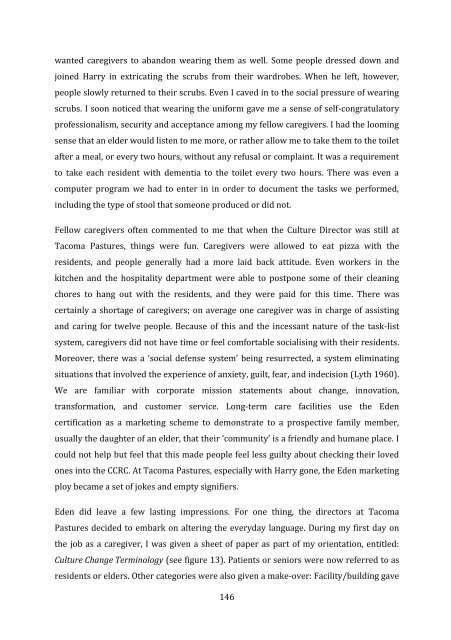Philip Y. Kao PhD thesis - Research@StAndrews:FullText
Philip Y. Kao PhD thesis - Research@StAndrews:FullText
Philip Y. Kao PhD thesis - Research@StAndrews:FullText
You also want an ePaper? Increase the reach of your titles
YUMPU automatically turns print PDFs into web optimized ePapers that Google loves.
wanted caregivers to abandon wearing them as well. Some people dressed down and<br />
joined Harry in extricating the scrubs from their wardrobes. When he left, however,<br />
people slowly returned to their scrubs. Even I caved in to the social pressure of wearing<br />
scrubs. I soon noticed that wearing the uniform gave me a sense of self-congratulatory<br />
professionalism, security and acceptance among my fellow caregivers. I had the looming<br />
sense that an elder would listen to me more, or rather allow me to take them to the toilet<br />
after a meal, or every two hours, without any refusal or complaint. It was a requirement<br />
to take each resident with dementia to the toilet every two hours. There was even a<br />
computer program we had to enter in in order to document the tasks we performed,<br />
including the type of stool that someone produced or did not.<br />
Fellow caregivers often commented to me that when the Culture Director was still at<br />
Tacoma Pastures, things were fun. Caregivers were allowed to eat pizza with the<br />
residents, and people generally had a more laid back attitude. Even workers in the<br />
kitchen and the hospitality department were able to postpone some of their cleaning<br />
chores to hang out with the residents, and they were paid for this time. There was<br />
certainly a shortage of caregivers; on average one caregiver was in charge of assisting<br />
and caring for twelve people. Because of this and the incessant nature of the task-list<br />
system, caregivers did not have time or feel comfortable socialising with their residents.<br />
Moreover, there was a ‘social defense system’ being resurrected, a system eliminating<br />
situations that involved the experience of anxiety, guilt, fear, and indecision (Lyth 1960).<br />
We are familiar with corporate mission statements about change, innovation,<br />
transformation, and customer service. Long-term care facilities use the Eden<br />
certification as a marketing scheme to demonstrate to a prospective family member,<br />
usually the daughter of an elder, that their ‘community’ is a friendly and humane place. I<br />
could not help but feel that this made people feel less guilty about checking their loved<br />
ones into the CCRC. At Tacoma Pastures, especially with Harry gone, the Eden marketing<br />
ploy became a set of jokes and empty signifiers.<br />
Eden did leave a few lasting impressions. For one thing, the directors at Tacoma<br />
Pastures decided to embark on altering the everyday language. During my first day on<br />
the job as a caregiver, I was given a sheet of paper as part of my orientation, entitled:<br />
Culture Change Terminology (see figure 13). Patients or seniors were now referred to as<br />
residents or elders. Other categories were also given a make-over: Facility/building gave<br />
146
















